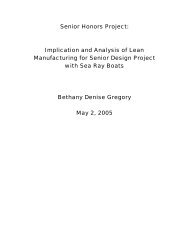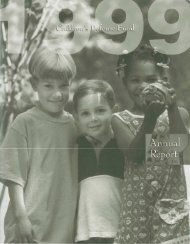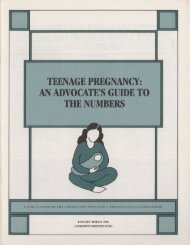children out of school in america - University of Tennessee Digital ...
children out of school in america - University of Tennessee Digital ...
children out of school in america - University of Tennessee Digital ...
Create successful ePaper yourself
Turn your PDF publications into a flip-book with our unique Google optimized e-Paper software.
formities to argue aga<strong>in</strong>st all <strong>children</strong> with special<br />
needs be<strong>in</strong>g placed <strong>in</strong> regular classes. The fact is,<br />
however, that the great majority <strong>of</strong> <strong>children</strong> with<br />
special needs are those who could pr<strong>of</strong>it from <strong>school</strong><strong>in</strong>g<br />
and become self-sufficient. A host <strong>of</strong> <strong>children</strong><br />
have mild physical disabilities, such as nearsightedness,<br />
deafness, or physical handicaps which<br />
<strong>in</strong> no way affect their <strong>in</strong>tellectual and social development.<br />
Parents, teachers and adrr.<strong>in</strong>istrators need to<br />
be educated to differentiate among special needs<br />
<strong>children</strong> and to learn what is appropriate, helpful or<br />
harmful <strong>in</strong> each case. Individual assessment is essential,<br />
as is a range <strong>of</strong> program options that would<br />
allow <strong>children</strong> to be <strong>in</strong>tegrated accord<strong>in</strong>g to their<br />
needs and abilities. 'ol<br />
Resistance to <strong>in</strong>tegration <strong>of</strong> programs for special<br />
needs <strong>children</strong> <strong>in</strong>to regular <strong>school</strong> programs may<br />
also come from some <strong>of</strong> those who perceive a stake<br />
<strong>in</strong> separate facilities and programs and who fear that<br />
their power base will be undercut with <strong>in</strong>tegration.<br />
Some advocate associations for handicapped <strong>children</strong><br />
prefer to ma<strong>in</strong>ta<strong>in</strong> separate fund<strong>in</strong>g because <strong>of</strong><br />
the small resource pie with<strong>in</strong> which they must compete<br />
aga<strong>in</strong>st other special needs groups and general<br />
<strong>school</strong> expenditures. They therefore foster label<strong>in</strong>g<br />
and segregation. Cohesive pressure among special<br />
needs groups is therefore rendered more difficult.<br />
All these attitudes must be reanalyzed from the<br />
po<strong>in</strong>t <strong>of</strong> view <strong>of</strong> <strong>children</strong> who, after all, should be<br />
the focus <strong>of</strong> those concerned. Children <strong>in</strong> regular<br />
classes should learn to accept <strong>children</strong> who have different<br />
k<strong>in</strong>ds <strong>of</strong> problems. Handicapped <strong>children</strong><br />
should not be isolated. Segregated programs usually<br />
lack leverage on central <strong>school</strong> resources, and they<br />
make it more likely that <strong>children</strong> (1) will be dumped<br />
aside; (2) will have their handicap emphasized<br />
rather than the similarities all <strong>children</strong> have <strong>in</strong> common;<br />
(3) will be stigmatized; (4) will receive little<br />
def<strong>in</strong>able educational benefit; and (5) will have<br />
greater difficulty adjust<strong>in</strong>g to a larger society <strong>in</strong> which<br />
they must live.<br />
A teacher at the Baxter State School for the Deaf<br />
which is located on an island <strong>in</strong> Casco Bay near<br />
Portland, Ma<strong>in</strong>e, commented:<br />
"The island is beautiful, its great for nature walks<br />
and the like, but completely unrealistic. Kids live<br />
here for 12 years and never deal with the hear<strong>in</strong>g<br />
world. Many <strong>of</strong> them do get job placements after.<br />
But they only live for eight hours with hear<strong>in</strong>g<br />
people and then withdraw."102<br />
The evidence <strong>of</strong> educational benefit to <strong>children</strong><br />
from separate special classes is unimpressive. For<br />
<strong>children</strong> with pr<strong>of</strong>ound problems - autistic <strong>children</strong><br />
or those whose IQ is below 25 - separate and special<br />
programs may have substantial benefits. But<br />
"research concern<strong>in</strong>g classes for <strong>children</strong> with more<br />
ambiguous handicaps - the educable mentally retarded,<br />
mildly emotionally disturbed and perceptually<br />
handicapped - reach quite different conclusions.<br />
Those programs do not tangibly benefit their<br />
students, whose equally handicapped counterparts<br />
placed <strong>in</strong> regular <strong>school</strong> classes perform at least as<br />
well and with<strong>out</strong> apparent detriment to their normal<br />
classmates."103<br />
Important steps are now be<strong>in</strong>g taken <strong>in</strong> several<br />
states that bear careful scrut<strong>in</strong>y. Massachusetts, for<br />
example, has recently passed a new Special Education<br />
law which is a model <strong>of</strong> flexibility and sensitivity<br />
to labels. Its passage is an example <strong>of</strong> effective <strong>out</strong>side<br />
advocacy comb<strong>in</strong>ed with responsive state legislative<br />
and executive <strong>of</strong>ficials. This coalition's strength<br />
will determ<strong>in</strong>e bow effectively the law is implemented.<br />
We hope other states will follow Massachusetts'<br />
lead. Those <strong>in</strong>terested <strong>in</strong> receiv<strong>in</strong>g more<br />
<strong>in</strong>formation on this state law and its progress should<br />
write to:<br />
David Liederman, Director<br />
State Office for Children<br />
120 Boylston Street<br />
Boston, Massachusetts 02116<br />
or to:<br />
Larry Brown, Director<br />
Massachusetts Advocacy Center<br />
Two Park Square - 7th Floor<br />
Boston, Massachusetts 02116.<br />
----<br />
101 For example, special education <strong>of</strong>ficials <strong>of</strong> the Public<br />
Schools <strong>of</strong> the District <strong>of</strong> Columbia, <strong>in</strong> September, 1972,<br />
devised a "Comprehensive Plan for Special Education" for<br />
ten levels <strong>of</strong> programm<strong>in</strong>g for <strong>children</strong> with special problems<br />
rang<strong>in</strong>g from regular classroom placement with supportive<br />
educational services to tuition grants to private<br />
<strong>school</strong> to <strong>in</strong>stitutionalization.<br />
102 Interview with a teacher, Baxter School for the Deaf,<br />
Portland. Ma<strong>in</strong>e who asked to rema<strong>in</strong> anonymous.<br />
l03 David Kirp, "Student Classification, Public Policy, and<br />
the Courts," Harvard Educational Review, Vol. 44, No.1,<br />
February, 1974, p. 19.<br />
115














